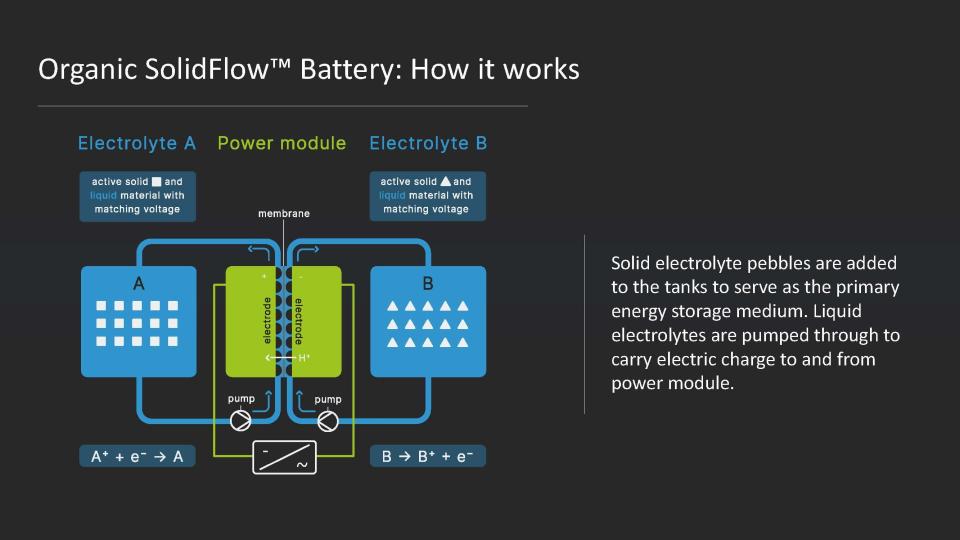Could an organic, recyclable battery be the future of large-scale battery storage? WEC Energy is launching a test to find out.
An organic and almost entirely recyclable battery could be an answer to utlities' search for higher-performance, more environmentally friendly ways of storing energy and releasing it as needed to power homes and businesses.
WEC Energy group is partnering the Electric Power Research Institute to test a battery developed by CMBlu Energy AG, a 10-year-old German company that recently opened an office in Petaluma, California. The test at the Valley Power Plant in Milwaukee will be the first connection of the battery to the electric grid in the United States.
The battery, called an organic flow battery, is seen as an alternative to the lithium batteries that have become standard in everything from cell phones to electric cars and utility-scale battery arrays. Flow batteries hold the promise of being able to hold a charge over longer periods of time and to discharge energy for up to 10 hours, more than double the duration of a comparably sized lithium battery.
Effective and affordable energy storage will play a critical role in the country's transition away from fossil fuels. Large quantities of reserve power will be needed on days when weather reduces the output of wind or solar energy, to boost available energy during times of peak demand and to improve the resiliency of the electric grid, said Dan Krueger, WEC Energy Group's executive vice president for infrastructure and generation planning.
Other companies are developing flow batteries to help meet those needs, but what's different about CMBlu's battery is that it uses organic chemistry and most of it is recyclable.
"This battery is a green battery," Krueger said. "So if we want to go all in on the transition, this is why we think it is worth it. We've never seen something that is almost entirely recyclable, coupled with terrific performance. For that reason, we think it's worth giving it a shot."
Related: We Energies' parent company tested hydrogen to help reduce carbon emissions. Is it sustainable?
The 1 to 2 megawatt-hour battery — large enough to power about 1,000 homes — will be tested at the Valley Power Plant toward the end of the year after an intitial round of tests in Denver. The Milwaukee tests will evaluate the battery's ability to hold and discharge power over time frames of up to 10 hours.
CMBlu's technology is proprietary, but in simple terms its composed of two tanks each with a liquid that carries the charge from "pebbles" in each tank. One tank's liquid has a negative charge, the other is positive, and they react to produce energy when pumped past a membrane in a container known as a stack. The battery is recharged by reversing the flow.

The battery components are organic materials from readily available sources in the United States, said Ben Kaun, president of CMBlu Energy Inc., the company's U.S. subsidiary.
One of the advantages of CMBlu's flow battery is that it's scalable, Kaun said. The amount of energy it can store can be increased by increasing the size of the tanks, as opposed to lithium battery arrays, which can only be scaled up by adding more battery cells.
He described the upcoming tests in Milwaukee as a "kicking the tires" step toward broader adoption of its battery technology. The company hopes to begin commercial production of its batteries in 2025.
"We're very glad that WEC is motivated to work with emerging technologies," he said. "That's not a universal characteristic of electric utilities, because it's a conservative business and there's not a lot of reward to taking risks, but, you know, things are changing with decarbonization."
Krueger said lithium-based batteries will remain a significant part of WEC Energies' storage strategy even if the experiment with CMBlu meets expectations. However, one of the advantages of CMBlu's battery is that the materials are all sourced domestically, alleviating the supply-chain challenges of lithium.
"They're made from common materials, we don't have to worry about foreign supply chains. And the duration is twice as long as your typical lithium-ion battery. So if we put it all together that is a significant potential breakthrough," Kureger said.
Neva Espinoza, EPRI's vice president for energy supply and low-carbon resources, said the test of CMBlu's battery is just one step in assessing the flow battery technology before it can become readily adopted by power companies and large energy users. EPRI will share its findings from the test with the utility industry in early 2024.
"I think you're going to see a lot of development into commercial application within the next few years," she said.
Our subscribers make this reporting possible. Please consider supporting local journalism by subscribing to the Journal Sentinel at jsonline.com/deal.
DOWNLOAD THE APP: Get the latest news, sports and more
This article originally appeared on Milwaukee Journal Sentinel: WEC Energy testing organic, recyclable battery as alternative to lithium

